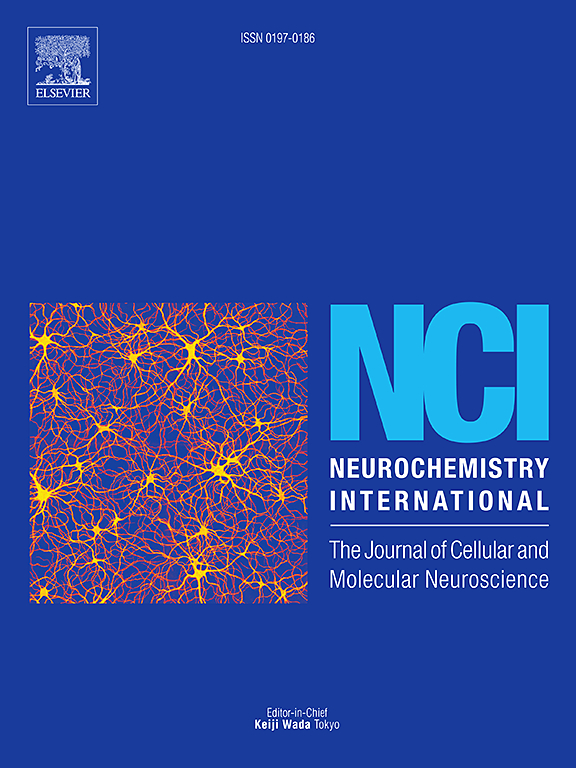Potential roles of inhalation aromatherapy on stress-induced depression by inhibiting inflammation in the peripheral olfactory system
IF 4
3区 医学
Q2 BIOCHEMISTRY & MOLECULAR BIOLOGY
引用次数: 0
Abstract
According to principles of Traditional Chinese Medicine, the nose is the passage for exogenous evil to invade the body, while essential or volatile oils extracted from herbs have the effects of dispelling melancholy, repelling foulness, and resuscitation with aromatics. Inhalation aromatherapy can target the brain and has a potential therapeutic effect on mood disorders. However, in particular, the mechanism of the effect of inhalation aromatherapy on the olfactory mucosa (OM) of the nasal cavity at the peripheral level, the first step in olfactory detection, where olfactory sensory neurons (OSNs) relay information to brain for signal processing, remains unclear. Here, we examined the roles of inhalation aromatherapy with compound essential oils derived from Bergamot, Peppermint and Rosa rugose on chronic unpredictable mild stress (CUMS)-induced depression and explored potential therapeutic targets in the peripheral OM. We found that inhalation aromatherapy effectively ameliorated CUMS-induced depression and olfactory dysfunction in rats. Strikingly, inhalation aromatherapy improved pathological changes, significantly reduced apoptosis levels, and promoted olfactory neurogenesis in the OM, which may contribute to the beneficial effects on the olfactory function of depressed rats. Further, inhalation aromatherapy significantly may reverse inflammation levels in the OM through Sirt1/FKBP5/GR/NF-κB signaling pathway, and prevented neuroinflammation in other parts of the olfactory system such as the hippocampus and prefrontal cortex, which may play a role in the olfactory impairments in rats with depression. Collectively, we have demonstrated that inhalation aromatherapy could efficiently prevent the local inflammatory responses in the OM of CUMS depression model rats. These findings provide new insights into the treatment of depression with aromatherapy, as well as new concept for the identification of novel antidepressant strategies.

吸入芳香疗法通过抑制外周嗅觉系统炎症对应激性抑郁症的潜在作用。
根据中医原理,鼻子是外邪侵入人体的通道,而从草药中提取的精油或挥发油具有驱散忧郁、驱除污秽和芳香复苏的作用。吸入芳香疗法可以针对大脑,对情绪障碍有潜在的治疗效果。然而,特别是吸入芳香疗法对外周水平鼻腔嗅粘膜(OM)的影响机制尚不清楚,这是嗅觉检测的第一步,嗅感觉神经元(OSNs)将信息传递给大脑进行信号处理。在这里,我们研究了从佛手柑、薄荷和玫瑰中提取的复方精油吸入芳香疗法在慢性不可预测的轻度应激(CUMS)诱导的抑郁症中的作用,并探索了外周OM的潜在治疗靶点。我们发现吸入芳香疗法可以有效地改善cms诱导的大鼠抑郁和嗅觉功能障碍。引人注目的是,吸入芳香疗法改善了病理改变,显著降低了细胞凋亡水平,促进了嗅觉神经的发生,这可能有助于改善抑郁症大鼠的嗅觉功能。此外,吸入芳香疗法可能通过Sirt1/FKBP5/GR/NF-κB信号通路显著逆转OM的炎症水平,并阻止海马和前额叶皮质等嗅觉系统其他部位的神经炎症,这可能在抑郁症大鼠的嗅觉损伤中发挥作用。综上所述,我们已经证明了吸入芳香疗法可以有效地预防CUMS抑郁模型大鼠OM的局部炎症反应。这些发现为芳香疗法治疗抑郁症提供了新的见解,也为确定新的抗抑郁药物策略提供了新的概念。
本文章由计算机程序翻译,如有差异,请以英文原文为准。
求助全文
约1分钟内获得全文
求助全文
来源期刊

Neurochemistry international
医学-神经科学
CiteScore
8.40
自引率
2.40%
发文量
128
审稿时长
37 days
期刊介绍:
Neurochemistry International is devoted to the rapid publication of outstanding original articles and timely reviews in neurochemistry. Manuscripts on a broad range of topics will be considered, including molecular and cellular neurochemistry, neuropharmacology and genetic aspects of CNS function, neuroimmunology, metabolism as well as the neurochemistry of neurological and psychiatric disorders of the CNS.
 求助内容:
求助内容: 应助结果提醒方式:
应助结果提醒方式:


